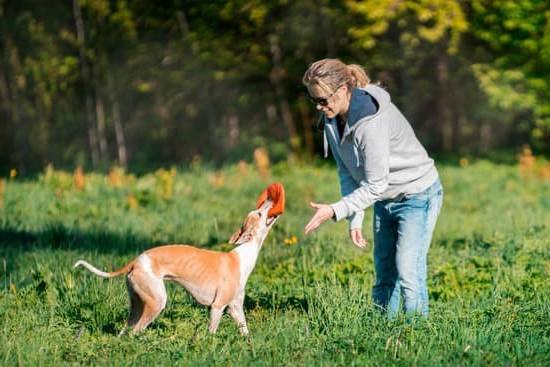Becoming a service dog trainer requires more than just a love for animals and a desire to help others. It takes dedication, specialized skills, and a deep understanding of the responsibilities involved in training service dogs.
Service dog trainers play a crucial role in improving the quality of life for individuals with disabilities by providing them with specially trained canine companions. In this article, we will explore what it takes to become a service dog trainer, from the necessary qualifications and education to the essential skills and traits required for success in this field.
Service dog trainers are responsible for training and preparing dogs to assist individuals with disabilities, such as visual or hearing impairments, physical limitations, or emotional support needs. The impact of these specially trained dogs on their handlers’ lives is profound, as they provide essential support and assistance in daily activities. Understanding the significance of this role is crucial for anyone considering becoming a service dog trainer.
In addition to discussing the responsibilities of service dog trainers and highlighting the positive impact of service dogs on individuals with disabilities, we will delve into the qualifications and education required for this profession. We will also explore the essential skills and traits that aspiring trainers need to possess, as well as the various training programs and apprenticeships available to kick-start their career in service dog training.
Qualifications and Education
Becoming a service dog trainer requires a combination of qualifications and education to effectively train and work with these specialized animals. Service dog trainers are responsible for preparing dogs to assist individuals with disabilities, and this role comes with its own set of unique challenges and rewards. To pursue a career in service dog training, individuals must meet certain criteria and obtain the necessary education and certifications.
Here are some key qualifications and educational requirements for aspiring service dog trainers:
- High School Diploma or Equivalent: A foundational requirement for becoming a service dog trainer is a high school diploma or its equivalent. This serves as the starting point for individuals who wish to pursue further education and training in this field.
- College Degree: While not always mandatory, obtaining a degree in animal science, veterinary medicine, psychology, or a related field can significantly benefit individuals seeking to become service dog trainers. These degrees provide a strong foundation in understanding animal behavior, learning theory, and the psychological aspects of training.
- Certifications and Training Programs: Many aspiring service dog trainers choose to enroll in specialized certification programs or training courses specifically tailored to working with service dogs. These programs often cover topics such as obedience training, task-specific training, behavior modification, laws pertaining to service animals, and ethical considerations. Additionally, hands-on experience through apprenticeships or internships can provide valuable practical knowledge.
Gaining the necessary qualifications and education is an essential step towards becoming a successful service dog trainer. By pursuing relevant courses, certifications, and practical experience opportunities, individuals can develop the skills needed to make a meaningful impact in this rewarding profession. Ultimately, dedication to continuous learning and growth is what it takes to become a proficient service dog trainer capable of transforming the lives of both dogs and their human companions.
Skills and Traits
Becoming a service dog trainer requires a unique set of skills and traits that are essential for success in this role. Here are some of the key qualities that aspiring trainers need to possess:
1. Patience: Training service dogs can be a time-consuming process, and it requires a great deal of patience. Trainers must be able to work with dogs at their individual pace, understanding that each dog may have different learning abilities.
2. Empathy: A successful service dog trainer must have the ability to understand the needs of both the dogs and the individuals they will eventually serve. Having empathy towards both parties is crucial for building a strong bond and ensuring effective training.
3. Adaptability: Every dog is unique, and trainers must be adaptable in their approach to meet the specific needs of each individual dog. Being able to adjust training methods based on the personality and behavior of the dog is essential for successful outcomes.
In addition to these traits, there are also specific skills that are necessary for becoming a proficient service dog trainer. These include proficiency in basic obedience training, understanding canine behavior, and effective communication with both dogs and their future handlers.
Overall, what it takes to become a service dog trainer goes beyond just having a passion for working with animals. It requires a combination of patience, empathy, adaptability, and specialized skills that are tailored specifically to the unique role of training service dogs.
Training Programs and Apprenticeships
Types of Training Programs
Aspiring service dog trainers have the option to pursue various types of training programs and apprenticeships to gain the necessary knowledge and skills for this career. Some programs are offered by accredited institutions, while others are provided by experienced professionals in the field.
These programs often include a combination of classroom instruction, hands-on training, and supervised experience working with service dogs. Additionally, some programs may focus on specific areas of service dog training, such as mobility assistance or emotional support dog training.
Hands-on Experience and Mentorship
One of the key benefits of training programs and apprenticeships is the opportunity for aspiring service dog trainers to gain invaluable hands-on experience and mentorship. Working closely with experienced trainers allows individuals to observe effective training techniques, develop their skills in canine behavior analysis, and understand the nuances of working with different types of service dogs. Mentorship also provides guidance on ethical practices, legal considerations, and the overall responsibilities involved in training service dogs.
Choosing the Right Program
When considering a training program or apprenticeship for becoming a service dog trainer, it’s crucial for individuals to carefully research and compare their options. They should look for programs that are reputable, offer comprehensive education in canine behavior and training methods, provide opportunities for practical application of skills, and ensure ethical treatment of animals. Selecting the right program can significantly impact an individual’s preparedness for a career in service dog training.
Ultimately, training programs and apprenticeships play a vital role in shaping the next generation of service dog trainers by providing them with the knowledge, skills, and real-world experience necessary to succeed in this challenging yet rewarding profession.
Understanding Canine Behavior and Training Techniques
Becoming a successful service dog trainer requires a deep understanding of canine behavior and effective training techniques. By mastering these fundamental aspects, trainers can provide invaluable support to individuals with disabilities who rely on service dogs for assistance. Understanding the intricacies of canine behavior and implementing proven training methods are essential components of this profession.
One key aspect of understanding canine behavior is recognizing that each dog is unique, with its own temperament, personality, and learning style. As a service dog trainer, it is crucial to have a solid grasp of canine psychology and behavior in order to tailor training programs to meet the specific needs of each individual dog. This involves studying various factors such as body language, socialization, and communication within the context of canine behavior.
In addition to comprehending canine behavior, service dog trainers must also be well-versed in an array of training techniques. Positive reinforcement, for example, is widely regarded as an effective method for shaping desired behaviors in dogs.
By utilizing rewards such as treats or praise to reinforce positive actions, trainers can foster meaningful connections with the dogs they work with. It’s also essential for trainers to have a diverse toolkit of training techniques that can be adapted to different situations and temperaments.
| Canine Behavior | Effective Training Techniques |
|---|---|
| Understanding unique temperament and learning style | Implementing positive reinforcement methods |
| Studying body language and socialization | Adapting training techniques to specific needs |
| Recognizing individual personality traits | Utilizing rewards such as treats or praise |
By honing their knowledge of canine behavior and refining their training techniques, aspiring service dog trainers can build a strong foundation for success in this rewarding field. This expertise not only benefits the dogs themselves but also plays a vital role in enhancing the lives of individuals who depend on these highly trained animals for assistance. Through continued education and practical experience, dedicated individuals can develop the skills needed to excel as service dog trainers.
Specialization in Service Dog Training
Service dog training is a specialized field that requires a deep understanding of canine behavior, as well as the ability to cater to the specific needs of individuals with disabilities. Within the realm of service dog training, there are various specializations that trainers can pursue.
These specializations include mobility assistance, guide dog training, and emotional support dog training. Each of these areas requires a unique set of skills and expertise in order to effectively train and match service dogs with their human companions.
Mobility assistance dog training involves teaching dogs to assist individuals with physical disabilities in tasks such as opening doors, retrieving items, and providing balance support. This specialization demands a thorough understanding of how to train dogs to perform complex tasks that directly benefit individuals with mobility challenges.
Guide dog training focuses on teaching dogs to safely guide visually impaired individuals through various environments, while emotional support dog training entails working with dogs that provide comfort and calming effects to individuals struggling with mental health issues.
To excel in any of these specializations, service dog trainers must possess strong communication skills, patience, empathy, and an inherent passion for helping others. They should also have a keen understanding of the laws and regulations surrounding service animals and be willing to work closely with both the dogs and the individuals they will be assisting.
| Specialization | Key Skills Required |
|---|---|
| Mobility Assistance | Understanding of physical disabilities; ability to teach complex tasks |
| Guide Dog Training | Ability to navigate various environments; strong communication skills |
| Emotional Support Dog Training | Empathy; understanding of mental health issues; calming presence |
Legal and Ethical Considerations
Aspiring service dog trainers need to be aware of the legal and ethical considerations that come with this profession. It is important to understand the rights and responsibilities of both the trainer and the service dog, as well as the individuals they serve.
Adherence to Industry Standards
Service dog trainers must adhere to industry standards set forth by organizations such as Assistance Dogs International (ADI) or the International Association of Canine Professionals (IACP). These standards ensure that trainers are providing high-quality care and training for service dogs, while also upholding ethical practices in their work.
Animal Welfare Laws
Trainers must also be knowledgeable about animal welfare laws in their respective regions. This includes understanding regulations related to housing, transportation, and general care for service dogs. Additionally, trainers should stay informed about any updates or changes to these laws to ensure compliance.
Ethical Treatment
Ethical treatment of both the dogs and the individuals they serve is paramount in service dog training. This includes respecting the physical and emotional well-being of the dogs, as well as ensuring that they are placed in environments where they can thrive. Trainers must also uphold integrity and empathy when working with clients who have disabilities, maintaining a professional and respectful demeanor at all times.
By understanding and adhering to these legal and ethical considerations, aspiring service dog trainers can contribute to the positive impact that service dogs have on individuals with disabilities while upholding their professional responsibilities.
Career Opportunities and Growth
In conclusion, becoming a service dog trainer requires a unique combination of skills, traits, and specialized knowledge. It demands not only a deep understanding of canine behavior and training techniques but also empathy, patience, and adaptability. Moreover, it entails a commitment to ethical treatment of both the animals and the individuals they serve. With the increasing demand for service dogs in various fields such as healthcare and rehabilitation, there are ample career opportunities for aspiring trainers.
The field of service dog training offers diverse career pathways, including specialization in mobility assistance, guide dog training, and emotional support dog training. Each specialization requires specific skills and expertise, offering trainers the opportunity to pursue an area that aligns with their interests and strengths. As the need for service dogs continues to grow, so do the career prospects for individuals seeking to enter this rewarding profession.
In today’s society where the impact of service dogs on individuals with disabilities is increasingly recognized and valued, service dog trainers play a crucial role. Their dedication to providing quality training not only enriches the lives of those they serve but also contributes to the overall well-being of both humans and animals alike.
With the right qualifications, education, skills, and commitment to ethical practice, aspiring service dog trainers can embark on a fulfilling career path that makes a meaningful difference in the lives of others.
Frequently Asked Questions
How Hard Is It to Train a Dog to Be a Service Dog?
Training a dog to be a service dog can be quite challenging and time-consuming. It involves specialized training to assist people with disabilities, such as guiding the blind, alerting the deaf, or providing assistance for mobility issues.
How Do Dog Trainers Make Money?
Dog trainers make money by offering their services to pet owners or organizations in need of professional training for their dogs. This can include obedience training, behavior modification, agility training, or specialized service dog training.
How Do I Become a Service Dog Trainer in Canada?
To become a service dog trainer in Canada, one typically needs to gain experience and knowledge in dog training through education and hands-on experience. This may involve obtaining certification through recognized programs and gaining practical experience working with service dogs under the guidance of experienced trainers.
Additionally, understanding the laws and regulations related to service animals in Canada is essential for this career path.

Welcome to the blog! I am a professional dog trainer and have been working with dogs for many years. In this blog, I will be discussing various topics related to dog training, including tips, tricks, and advice. I hope you find this information helpful and informative. Thanks for reading!





